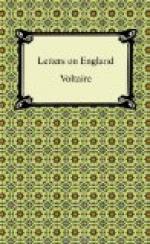Methinks it is clearly evident that beasts cannot be mere machines, which I prove thus. God has given to them the very same organs of sensation as to us: if therefore they have no sensation, God has created a useless thing; now according to your own confession God does nothing in vain; He therefore did not create so many organs of sensation, merely for them to be uninformed with this faculty; consequently beasts are not mere machines. Beasts, according to your assertion, cannot be animated with a spiritual soul; you will, therefore, in spite of yourself, be reduced to this only assertion, viz., that God has endued the organs of beasts, who are mere matter, with the faculties of sensation and perception, which you call instinct in them. But why may not God, if He pleases, communicate to our more delicate organs, that faculty of feeling, perceiving, and thinking, which we call human reason? To whatever side you turn, you are forced to acknowledge your own ignorance, and the boundless power of the Creator. Exclaim therefore no more against the sage, the modest philosophy of Mr. Locke, which so far from interfering with religion, would be of use to demonstrate the truth of it, in case religion wanted any such support. For what philosophy can be of a more religious nature than that, which affirming nothing but what it conceives clearly, and conscious of its own weakness, declares that we must always have recourse to God in our examining of the first principles?
Besides, we must not be apprehensive that any philosophical opinion will ever prejudice the religion of a country. Though our demonstrations clash directly with our mysteries, that is nothing to the purpose, for the latter are not less revered upon that account by our Christian philosophers, who know very well that the objects of reason and those of faith are of a very different nature. Philosophers will never form a religious sect, the reason of which is, their writings are not calculated for the vulgar, and they themselves are free from enthusiasm. If we divide mankind into twenty parts, it will be found that nineteen of these consist of persons employed in manual labour, who will never know that such a man as Mr. Locke existed. In the remaining twentieth part how few are readers? And among such as are so, twenty amuse themselves with romances to one who studies philosophy. The thinking part of mankind is confined to a very small number, and these will never disturb the peace and tranquillity of the world.




